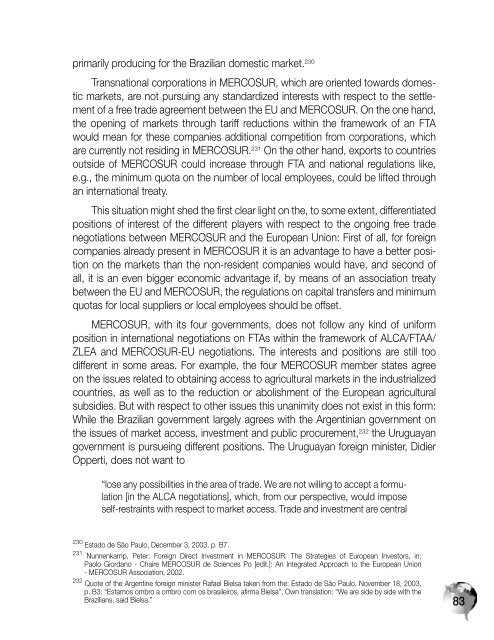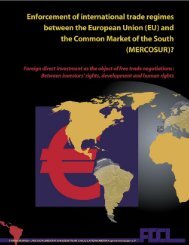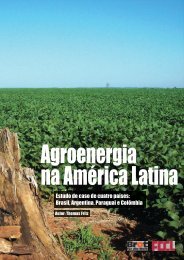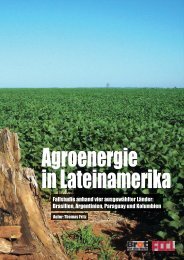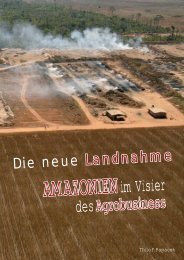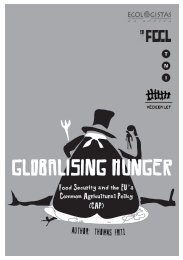(EU) and the Common Market of the South (MERCOSUR)? - FDCL
(EU) and the Common Market of the South (MERCOSUR)? - FDCL
(EU) and the Common Market of the South (MERCOSUR)? - FDCL
Create successful ePaper yourself
Turn your PDF publications into a flip-book with our unique Google optimized e-Paper software.
primarily producing for <strong>the</strong> Brazilian domestic market. 230<br />
Transnational corporations in <strong>MERCOSUR</strong>, which are oriented towards domestic<br />
markets, are not pursuing any st<strong>and</strong>ardized interests with respect to <strong>the</strong> settlement<br />
<strong>of</strong> a free trade agreement between <strong>the</strong> <strong>EU</strong> <strong>and</strong> <strong>MERCOSUR</strong>. On <strong>the</strong> one h<strong>and</strong>,<br />
<strong>the</strong> opening <strong>of</strong> markets through tariff reductions within <strong>the</strong> framework <strong>of</strong> an FTA<br />
would mean for <strong>the</strong>se companies additional competition from corporations, which<br />
are currently not residing in <strong>MERCOSUR</strong>. 231 On <strong>the</strong> o<strong>the</strong>r h<strong>and</strong>, exports to countries<br />
outside <strong>of</strong> <strong>MERCOSUR</strong> could increase through FTA <strong>and</strong> national regulations like,<br />
e.g., <strong>the</strong> minimum quota on <strong>the</strong> number <strong>of</strong> local employees, could be lifted through<br />
an international treaty.<br />
This situation might shed <strong>the</strong> first clear light on <strong>the</strong>, to some extent, differentiated<br />
positions <strong>of</strong> interest <strong>of</strong> <strong>the</strong> different players with respect to <strong>the</strong> ongoing free trade<br />
negotiations between <strong>MERCOSUR</strong> <strong>and</strong> <strong>the</strong> European Union: First <strong>of</strong> all, for foreign<br />
companies already present in <strong>MERCOSUR</strong> it is an advantage to have a better position<br />
on <strong>the</strong> markets than <strong>the</strong> non-resident companies would have, <strong>and</strong> second <strong>of</strong><br />
all, it is an even bigger economic advantage if, by means <strong>of</strong> an association treaty<br />
between <strong>the</strong> <strong>EU</strong> <strong>and</strong> <strong>MERCOSUR</strong>, <strong>the</strong> regulations on capital transfers <strong>and</strong> minimum<br />
quotas for local suppliers or local employees should be <strong>of</strong>fset.<br />
<strong>MERCOSUR</strong>, with its four governments, does not follow any kind <strong>of</strong> uniform<br />
position in international negotiations on FTAs within <strong>the</strong> framework <strong>of</strong> ALCA/FTAA/<br />
ZLEA <strong>and</strong> <strong>MERCOSUR</strong>-<strong>EU</strong> negotiations. The interests <strong>and</strong> positions are still too<br />
different in some areas. For example, <strong>the</strong> four <strong>MERCOSUR</strong> member states agree<br />
on <strong>the</strong> issues related to obtaining access to agricultural markets in <strong>the</strong> industrialized<br />
countries, as well as to <strong>the</strong> reduction or abolishment <strong>of</strong> <strong>the</strong> European agricultural<br />
subsidies. But with respect to o<strong>the</strong>r issues this unanimity does not exist in this form:<br />
While <strong>the</strong> Brazilian government largely agrees with <strong>the</strong> Argentinian government on<br />
<strong>the</strong> issues <strong>of</strong> market access, investment <strong>and</strong> public procurement, 232 <strong>the</strong> Uruguayan<br />
government is pursueing different positions. The Uruguayan foreign minister, Didier<br />
Opperti, does not want to<br />
“lose any possibilities in <strong>the</strong> area <strong>of</strong> trade. We are not willing to accept a formulation<br />
[in <strong>the</strong> ALCA negotiations], which, from our perspective, would impose<br />
self-restraints with respect to market access. Trade <strong>and</strong> investment are central<br />
230 Estado de São Paulo, December 3, 2003, p. B7.<br />
231 Nunnenkamp, Peter: Foreign Direct Investment in <strong>MERCOSUR</strong>: The Strategies <strong>of</strong> European Investors, in:<br />
Paolo Giordano - Chaire <strong>MERCOSUR</strong> de Sciences Po [edit.]: An Integrated Approach to <strong>the</strong> European Union<br />
- <strong>MERCOSUR</strong> Association, 2002.<br />
232 Quote <strong>of</strong> <strong>the</strong> Argentine foreign minister Rafael Bielsa taken from <strong>the</strong>: Estado de São Paulo, November 18, 2003,<br />
p. B3: “Estamos ombro a ombro com os brasileiros, afirma Bielsa”, Own translation: “We are side by side with <strong>the</strong><br />
Brazilians, said Bielsa.”<br />
83


